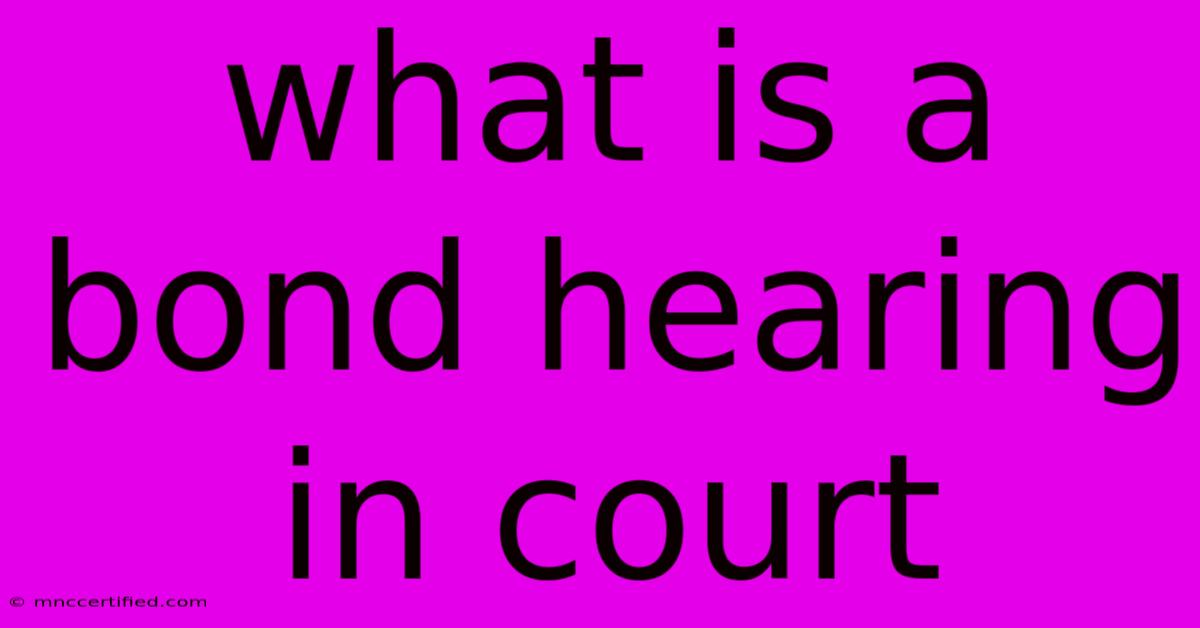What Is A Bond Hearing In Court

Table of Contents
What is a Bond Hearing in Court? A Comprehensive Guide
A bond hearing, also known as a bail hearing, is a crucial proceeding in the criminal justice system. It determines whether an accused individual will be released from custody before their trial and, if so, under what conditions. Understanding the process and your rights during a bond hearing is vital if you or someone you know is facing criminal charges. This comprehensive guide will delve into the intricacies of bond hearings, explaining the process, factors considered, and your options.
Understanding the Purpose of a Bond Hearing
The primary purpose of a bond hearing is to balance two competing interests: the public's safety and the defendant's right to liberty before conviction. The court must decide whether releasing the accused poses an unacceptable risk to the community. Simultaneously, the court recognizes the presumption of innocence and aims to avoid detaining individuals unnecessarily.
Key Players in a Bond Hearing
Several key players participate in a bond hearing:
- The Judge: Presides over the hearing, listens to arguments, and ultimately makes the decision regarding bond.
- The Prosecutor: Presents the state's case, arguing why the defendant should remain in custody or be held under strict conditions. They highlight the seriousness of the charges and potential risks to public safety.
- The Defense Attorney: Advocates for the defendant's release, presenting arguments and evidence to support their client's suitability for bond. They may highlight the defendant's ties to the community, employment history, and lack of prior criminal record.
- The Defendant: Has the right to attend the hearing, though they may choose not to speak. Their presence allows the judge to assess their demeanor and overall situation.
- Bail Bondsman (Sometimes): If the defendant uses a bail bondsman, they may be present to guarantee the defendant's appearance in court.
Factors Considered by the Judge
The judge considers several factors when deciding whether to grant bond and setting its conditions:
- The Severity of the Charges: More serious crimes, such as violent felonies, often result in higher bonds or denial of bail.
- The Defendant's Criminal History: A history of prior convictions, especially for similar offenses, increases the likelihood of denial or a higher bond.
- Flight Risk: The judge assesses the likelihood of the defendant fleeing the jurisdiction before trial. Factors such as ties to the community, employment, and family connections are considered.
- Danger to the Community: The judge considers whether the defendant poses a risk of harming others or committing further crimes if released. This is particularly relevant in cases involving domestic violence, weapons charges, or other violent offenses.
- Defendant's Financial Resources: The ability to pay the bond amount is a significant factor, influencing whether a cash bond, property bond, or surety bond is appropriate.
Types of Bond
Several types of bond exist, each with its own conditions:
- Cash Bond: The defendant pays the full amount of the bond in cash. This money is returned upon completion of the court proceedings.
- Property Bond: The defendant pledges real estate as collateral. If the defendant fails to appear, the property may be forfeited.
- Surety Bond: A bail bondsman posts the bond on behalf of the defendant, usually for a fee (often 10% of the bond amount).
- Unsecured Bond: The defendant is released without posting any money or property, but agrees to appear in court. Failure to appear results in a warrant for their arrest and forfeiture of the bond amount.
- Release on Recognizance (ROR): The defendant is released without posting any bond, based solely on their promise to appear in court. This is often granted for minor offenses.
What Happens After the Bond Hearing?
After the hearing, the judge will announce their decision. If bond is granted, the defendant will be released from custody upon meeting the specified conditions. If bond is denied, the defendant will remain in jail until their trial.
Appealing a Bond Decision
If the defendant disagrees with the judge's decision, they can appeal the bond amount or denial of bail. This appeal typically needs to be filed promptly. The appeal process often involves presenting additional evidence or arguing legal points overlooked during the initial hearing.
Disclaimer: This information is for educational purposes only and should not be considered legal advice. Consult with a qualified attorney for advice on your specific situation. The laws and procedures regarding bond hearings can vary significantly depending on jurisdiction.

Thank you for visiting our website wich cover about What Is A Bond Hearing In Court. We hope the information provided has been useful to you. Feel free to contact us if you have any questions or need further assistance. See you next time and dont miss to bookmark.
Featured Posts
-
How To Get A Bonded Title Texas
Nov 23, 2024
-
Mc Cormick Wins Pennsylvania Senate Race
Nov 23, 2024
-
James Bond Burgered Your Sister
Nov 23, 2024
-
Bond Forfeiture Speeding Ticket
Nov 23, 2024
-
Eh Taylor Bottled In Bond Price
Nov 23, 2024